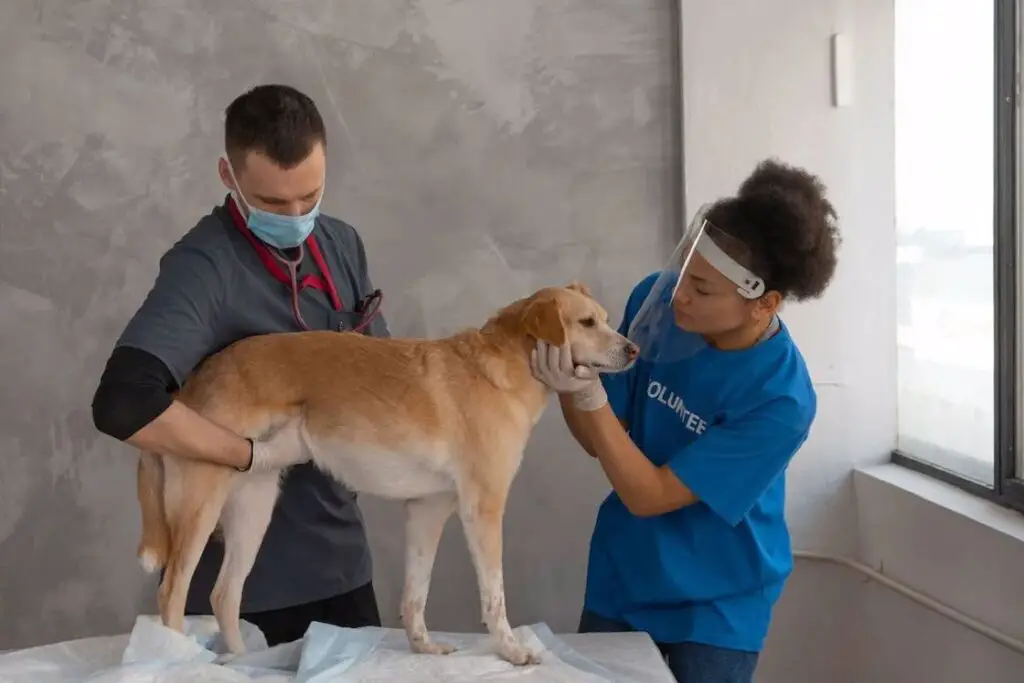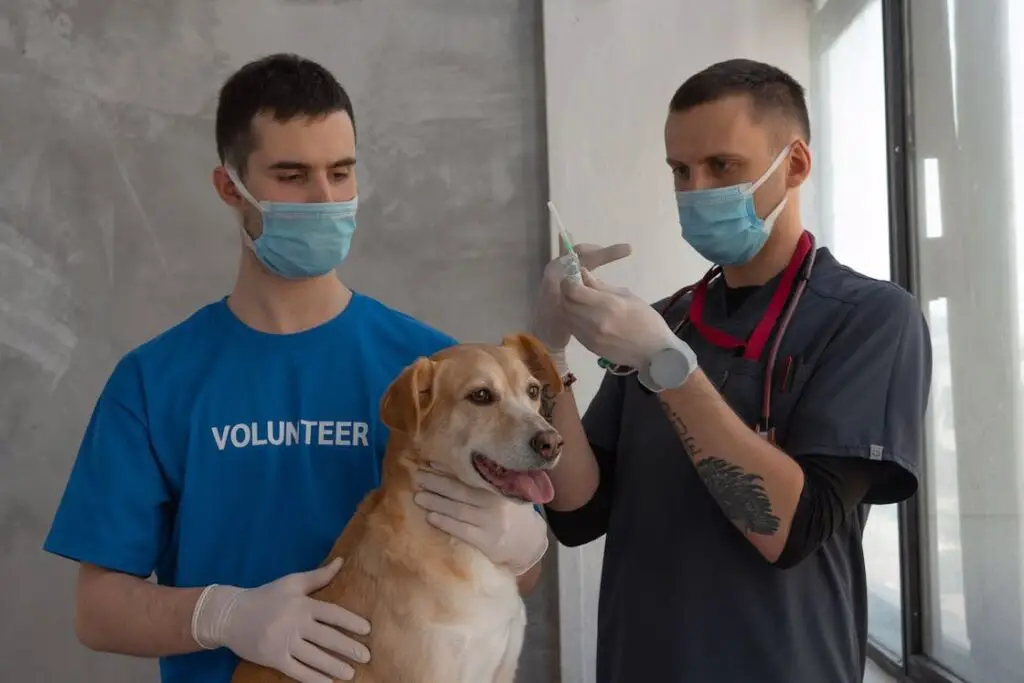There are many vaccines that need to be given to dogs, and some of them need to be boosted from time to time. If you have a new dog, you might wonder how long dogs’ vaccines last, and how often you should boost them.
Contents
How Long Do Dog Vaccines Last?
Even though some dog vaccines can last up to three years until they must be boosted, dog vaccines do expire at some point. On the other hand, non-core vaccines require annual boosters to ensure the dog’s body remains protected. Though, they are not strictly required.
Some dogs have special requirements that you need to take care of. Therefore, we need to check your dog at least twice a year. To fully understand this, you need to learn about your dog’s core and non-core vaccines.
Since dogs can contract diseases that harm their bodies and minds, it is essential to vaccinate them correctly. After all, many of these diseases can make your dog vomit, cough, experience seizures and other serious side effects.
How Long Do Core Vaccines Last?
When discussing core vaccines, we refer to the most critical vaccines that all dogs should have. These will protect your dog from numerous diseases that can affect your dog’s well-being. For example, rabies is one of the most essential core vaccines for dogs.
On the other hand, other core vaccines are distemper, canine hepatitis, canine parvovirus, and adenovirus. Most of these vaccines last no longer than three years until they must be boosted.
Your pets should get protection against these diseases because most of them are incurable or extremely difficult to treat. It’s best to prevent a disease from occurring since fatal diseases like parvo or distemper, which can shorten the lives of your dogs pretty fast. This is why you must first get familiar with each of their most serious illnesses to understand how long dogs’ immunizations last.
Rabies
The first rabies vaccination dosage should be administered within the first four months of life. This vaccination must be given at four months of age, in which it will be good for a year, and then boosted at one year old. Then every three years. In Riverside County, it is mandated for dogs to be vaccinated against Rabies.
Rabies Fatality and Symptoms
If a rabid dog bit you, you must go to the doctor immediately and begin treatment. This is because you have a high chance of dying once rabies symptoms appear. As a result, you need to act quickly in these cases.
On top of that, rabies has a hundred percent mortality rate. This means that if your dog has rabies, it will not be able to recover. This disease attacks your dog’s nervous system and brain, which produces paralysis that eventually leads to death.
Unfortunately, all dogs diagnosed with rabies need to be euthanized to prevent them from spreading the disease. Here you can see the symptoms of rabies on your dog.
- Excessive drooling
- Difficulties when eating
- Paralysis and seizures
- Foaming at the mouth. Although this is one of the most known symptoms, it is not always present. Sometimes the dog doesn’t foam at the mouth. Instead, they just drool a lot.
- Fever
Dog Hepatitis
Canine hepatitis is a viral illness affecting your dog’s liver, eyes, kidneys, and lungs. Although it is not fatal in mild cases, it cannot be treated. As a result, if your dog contracted it, it would have to be treated and medicated regularly.
You need to apply the hepatitis vaccine at 8 weeks old and get a booster vaccine every three to four weeks until they are 16 weeks old. After this, the vaccine only needs to be boosted three years after the last. Some places booster annually.
However, you need to always consult your doctor and confirm whether your dog needs a new vaccine or not.
Hepatitis Fatality and Symptoms
Hepatitis symptoms include fever, vomiting, and discomfort around the liver. Dogs with hepatitis often live one to two years after the diagnosis. Also, since this is a contagious illness, you must keep them separate from other dogs.
This virus spreads by dogs ingesting infected dogs’ saliva, excrement, nasal discharge, and urine. As a result, you must restrict your dog’s interaction with other animals to prevent them from spreading the disease.
Canine Parvovirus
This virus is capable of infecting dogs of all ages. However, pups between 3 and 4 months are the most susceptible. This is a very important disease to avoid; after all, it has the potential to kill a puppy in less than three days. This virus causes heavy vomiting by attacking their intestines.
The first dose of the parvovirus vaccine should be applied as soon as 6 weeks old, then it needs to be boosted every 3 to 4 weeks until they are 16 weeks old. The puppy must get a booster vaccine one year after the last one. Lastly, the dog must get a booster every two to three years.
Parvovirus Fatality and Symptoms
The dogs have vomiting, diarrhea, and loss of appetite. Although there is no treatment for this virus, if treated immediately, the dog’s immune system can overcome it, and it’s possible that your dog can get better after contracting parvo. However, it is still dangerous because you have little time to respond to the dog’s symptoms.
This implies that if your dog contracts the Parvovirus and gets infected for more than three days, they will likely pass away. If they contract the virus, it is critical to keep the dog hydrated since continuous vomiting and diarrhea can dehydrate them.
Canine Adenovirus 1 and 2
When it comes to Adenovirus, there are two kinds: CAV-1, which causes hepatitis and respiratory issues, and CAV-2, which only causes minor respiratory issues. The second version is less fatal than the first one. However, both of them can be dangerous for your dog.
The vaccine for CAV-1 needs to be applied intranasally and boosted annually. On the other hand, the CAV-2 needs to be provided at 6 weeks old, and boosted every 3-4 weeks until they reach 16 weeks of age. Then, they will need a boost 1 year after that, and lastly, a boost 3 years after the last one.
How Long Do Non-core Vaccines Last?
Knowing how long vaccines last on your dog requires you to learn about the non-core vaccines. They usually last up to 1 year until they need to be boosted. Although they are not strictly required for your dog, they are a great way of preventing minor health problems.
Lyme Disease
This infection is transmitted by the bite of an infected tick. It causes fever and loss of appetite, and it can also harm their heart, joints, and their brains. It is curable if treated promptly, though there is a probability that your dog relapses over time.
This vaccine should be administered at 9 weeks old and boosted after 4 weeks. Then, this vaccine should be re-applied annually for dogs (only in case the dog is at risk). If your dog is not in an area where it can get bit by a tick, the vaccine is not necessary.
Canine Influenza
This illness is also known as dog flu. Dogs can catch this sickness airborne and through objects like collars and bowls. Their symptoms are lethargy, coughing, sneezing, runny eyes, and nasal discharge. However, this sickness is often very mild and is not a complication for dogs.
For the canine influenza vaccine, you should administer it to your dog at 8 weeks of age, and then a second dose 4 weeks after. Then, it should be boosted annually.
Related Questions
Here are some frequently asked questions about dog vaccines.
How Long Does It Take a Vaccine to Produce Immunity?
The vaccine produces full immunity in your dog 7 to 21 days after it was administered to them. This is the time that takes your dog’s body to understand the virus and create antibodies that can take it down.
Can I Vaccine My Dog if They Are Sick?
If your dog is unwell, you should not vaccinate them. Sickness might impair their immune system, causing the vaccine’s intended immunization process to fail. As a result, if your dog is unwell, it is best to wait until they are healthy before vaccinating them.
Will the Vaccine Get My Dog Sick?
No, however, it is normal for a dog to get lethargic after a vaccine. Their immune systems are working to recognize and understand the vaccine. Though, their lethargy should only last about 2 to 3 days.
Conclusion
When it comes to vaccines, you need to learn precisely when to administer them and if you need to get your dog’s booster shots annually for extended protection. This will ensure that your dog’s health will never get compromised.



